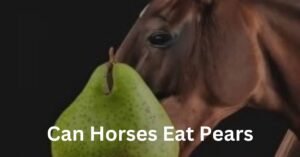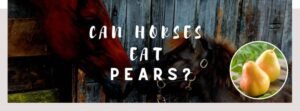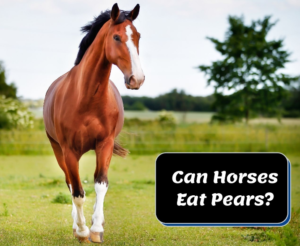can horses eat pears?

When it comes to feeding horses, owners frequently question the safety of different fruits and vegetables. The juicy sweetness of pears might make them appear to be an appealing snack for your horse. But can horses eat pears? This is an important question, given the specific dietary requirements and health considerations of horses.
Grasping the distinction between safe and unsafe options can greatly influence a horse’s health and well-being. Although numerous fruits present a healthy snack alternative, it’s essential to understand the details when incorporating new foods into a horse’s diet. Let’s explore whether pears are a fitting treat for horses, highlighting their nutritional advantages and possible hazards.
can horses eat pears
Yes, horses can eat pears in moderation as a healthy snack. However, there are a few things to keep in mind:
Sugar
Pears are sweet and contain sugar, so too many can lead to weight gain or dental issues.
Choking
Cut pears into small, bite-sized pieces to make them easier for horses to chew and digest, and to reduce the risk of choking. You should also remove the core and seeds before feeding the pear to your horse, as these can also be a choking hazard or cause gastrointestinal obstruction.
Other fruits that are safe for horses to eat include:
Apples, Apricots, Bananas, Blackberries, Coconuts, Grapefruits, Oranges, Peaches, Pineapples, Plums, Strawberries, and Watermelon.
Nutritional Benefits
| Nutrient | Benefit |
|---|---|
| Vitamin C | Supports immune function and skin health |
| Fiber | Aids in digestion and helps prevent constipation |
| Water | Helps keep horses hydrated |
Potential Risks
While pears can make for a nutritious snack, there are some potential risks to keep in mind:
- Sugar Content: Excessive sugar intake can contribute to weight gain and dental issues.
- Choking Risk: Large slices or entire fruits may be a choking hazard. Be sure to cut pears into small, manageable pieces.
Feeding pears to horses should be done sparingly, limiting it to 1-2 small slices several times a week. This approach allows horses to enjoy the nutritional benefits of pears without the negative effects of eating too much.
- Ensure a thorough wash: This helps eliminate any pesticides or chemicals.
- Cut into small pieces to avoid choking and aid in easier digestion.
- Introduce gradually: Begin with small quantities and monitor for any negative reactions.
It’s essential to grasp the balance between the nutritional benefits and potential risks of giving pears to horses. By adhering to the suggested guidelines, owners can safely add this delicious treat to their horses’ diets, ensuring they enjoy the benefits without encountering health issues.
Understanding a Horse’s Dietary Needs
Horses need a well-balanced diet that includes plenty of fiber, vitamins, and minerals to stay healthy. Their primary nutritional sources are pasture grass and hay, which supply the necessary fiber for proper digestion. Although fruits such as pears can provide extra nutrients, they should be offered sparingly to prevent excessive sugar consumption, particularly in horses that are susceptible to laminitis or metabolic disorders.
Gradually introducing new foods enables owners to observe their horse’s response and ensure it doesn’t upset their digestion. Although pears have certain minerals, they shouldn’t be the sole source for fulfilling nutritional requirements.
Adapting a horse’s diet according to its activity level and age is essential, as working horses and younger horses require more energy and nutrients. Seeking advice from an equine nutritionist or veterinarian can assist in developing a diet plan that addresses these specific needs by combining forage, concentrates, and supplements. This careful dietary management helps horses achieve optimal physical and mental well-being.
Nutritional Benefits of Pears for Horses
Pears are an excellent snack option for horses, providing a blend of vitamins, minerals, and hydration that can enhance their main diet of grass and hay. While pears shouldn’t replace these fundamental foods, they can introduce beneficial diversity and crucial nutrients to a horse’s dietary regimen.
One significant advantage of feeding pears to horses is their Vitamin C content. This antioxidant plays a vital role in supporting a healthy immune system and assisting in tissue repair and growth. Although horses naturally produce Vitamin C in their liver, the additional Vitamin C from pears can be especially beneficial, particularly for older horses whose natural production may be declining.
Pears provide dietary fiber, a crucial component for maintaining a healthy digestive system in horses. Although horses mainly obtain fiber from hay and grass, the extra fiber from pears can aid in regulating bowel movements and preventing constipation.
Moreover, pears provide a moderate level of crucial minerals like potassium and copper. Potassium is essential for regulating normal muscle activity and ensuring cellular health, whereas copper is important for the production of red blood cells, aiding in iron absorption, and keeping bones and connective tissue in horses healthy.
| Nutrient | Benefit for Horses |
|---|---|
| Vitamin C | Supports the immune system and tissue repair |
| Dietary Fiber | Aids digestion and bowel regulation |
| Potassium | Essential for muscle function and hydration balance |
| Copper | Important for blood cell formation and bone health |
It is important to keep in mind that although pears provide nutritional advantages, they also have sugar content. Thus, they should be given in moderation to prevent obesity and metabolic problems. Gradually introducing pears into a horse’s diet helps owners observe any negative reactions, ensuring this fruit remains a wholesome part of their nutrition plan.
Potential Risks of Feeding Pears to Horses
Giving pears to horses can be advantageous, but it is important to exercise care to prevent possible risks.
- Sugar Content and Obesity: Pears have natural sugars that can lead to weight gain and obesity if eaten in large amounts, which may raise the likelihood of metabolic disorders such as Equine Metabolic Syndrome and laminitis.
- Choking Hazards: Due to the size and texture of pears, they can be a choking risk. To avoid any accidents, be sure to cut them into smaller pieces before serving.
- Pesticides and Chemicals: Pears that are commercially cultivated might have residues of pesticides and chemicals. To reduce potential health risks, it is advisable to wash them thoroughly or choose organically grown pears.
- Digestive Issues: Suddenly adding pears or any unfamiliar food to a horse’s diet may lead to digestive problems. Therefore, it is recommended to introduce new foods gradually and observe the horse for any reactions over the course of several days.
It is essential to seek guidance from a veterinarian or equine nutritionist for personalized recommendations based on the horse’s health, activity level, and dietary requirements.
Conclusion
To sum up, giving pears to horses can offer significant nutritional advantages. However, it’s crucial for owners to recognize potential risks, including high sugar levels and the possibility of choking. Washing the pears thoroughly or choosing organic ones can help mitigate concerns about pesticide exposure.
Introducing pears gradually and observing the horse’s reaction is essential for safe dietary integration. Seeking advice from experts, like those at the Equine Institute, can ensure that these dietary changes fulfill the horse’s nutritional requirements without harming their health. With careful planning and attention, pears can be a beneficial addition to a horse’s diet, supporting their overall health and well-being.
Frequently Asked Questions
Can feeding pears to horses help hydrate them?
Certainly! Pears can aid in keeping horses hydrated thanks to their high water content. This makes them an excellent treat, particularly in hot weather, to support their hydration requirements.
What are the risks of feeding pears to horses?
The main risks associated with pears include possible weight gain and obesity due to their sugar content, which can elevate the likelihood of metabolic disorders and laminitis. Additionally, pears can pose a choking danger if not properly prepared and may carry harmful pesticides if they are not thoroughly washed or obtained organically.
How can one introduce pears into a horse’s diet safely?
To prevent digestive issues, gradually incorporate pears into a horse’s diet. Begin with small portions and incrementally raise the quantity depending on the horse’s tolerance. It’s also important to monitor the horse’s response to the new addition to its diet.
Greetings from the Petworled website management, we wish you success and see you in another article on our website.















